AR
-
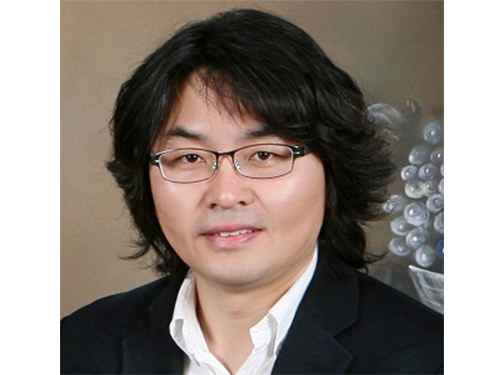 KAIST's Patina Engraving System Awarded at ACM CHI
Professor Tek-Jin Nam’s research team of the Industrial Design Department of KAIST received the Best Paper Award in the 2015 Association for Computing Machinery’s (ACM) Conference on Human Factors in Computing Systems (CHI) which was held from April 18 to 23, 2015. The team consisted of two KAIST students: Moon-Hwan Lee, a Ph.D. candidate, and Sejin Cha, a master's student. The team was the first in Asia to receive the award.
The ACM CHI represents the premier conference in the field of Human-Computer Interaction (HCI). This year’s event, held in Seoul, South Korea, was the first conference that the ACM had held in Asia in its thirty-three year history. The KAIST team’s paper, entitled “Patina Engraver: Visualizing Activity Logs as Patina in Fashionable Trackers,” ranked in the top 1% of 2,000 submitted papers.
The team developed Patina Engraver, an activity tracker, which monitors and tracks fitness-related metrics such as distances walked or run, calorie consumption, heartbeat, sleep quality, and blood pressure. The device wirelessly connects to a computer or smartphone so that it can store and utilize long-term tracking data.
However, what makes Patina Engraver, a smart wristband, different from other health trackers is its ability to display different design patterns based on users’ activity on the surface of the wristband. The research team was inspired to build this system from the fact that wearable electronics including activity trackers can be used not only as health care devices, but also as fashion items to express emotions and personalities.
Equipped with an engraving feature, the charging pad or holder for Patina Engraver draws individualized patterns to reflect the user’s activities, such as walking or running, while the device is being charged. The pattern display syncs with the frequency of usage, therefore, the more the tracker is used, the greater the number of patterns will show up.
According to the team, since Patina Engraver provides users with a personalized illustration of their activity on the tracker, users are more motivated to put on the tracker and exercise.
Professor Nam said, “This research can be applied in producing other wearable devices to enhance users’ emotional satisfaction. When wearable technology is combined with design and emotion, the industry market will quickly expand.”
Figure 1: Patina engraving system developed by KAIST research team
Figure 2: The process of engraving illustrations of the activity records onto the tracker
Figure 3: Personalized activity trackers based on activity records
2015.05.15 View 15415
KAIST's Patina Engraving System Awarded at ACM CHI
Professor Tek-Jin Nam’s research team of the Industrial Design Department of KAIST received the Best Paper Award in the 2015 Association for Computing Machinery’s (ACM) Conference on Human Factors in Computing Systems (CHI) which was held from April 18 to 23, 2015. The team consisted of two KAIST students: Moon-Hwan Lee, a Ph.D. candidate, and Sejin Cha, a master's student. The team was the first in Asia to receive the award.
The ACM CHI represents the premier conference in the field of Human-Computer Interaction (HCI). This year’s event, held in Seoul, South Korea, was the first conference that the ACM had held in Asia in its thirty-three year history. The KAIST team’s paper, entitled “Patina Engraver: Visualizing Activity Logs as Patina in Fashionable Trackers,” ranked in the top 1% of 2,000 submitted papers.
The team developed Patina Engraver, an activity tracker, which monitors and tracks fitness-related metrics such as distances walked or run, calorie consumption, heartbeat, sleep quality, and blood pressure. The device wirelessly connects to a computer or smartphone so that it can store and utilize long-term tracking data.
However, what makes Patina Engraver, a smart wristband, different from other health trackers is its ability to display different design patterns based on users’ activity on the surface of the wristband. The research team was inspired to build this system from the fact that wearable electronics including activity trackers can be used not only as health care devices, but also as fashion items to express emotions and personalities.
Equipped with an engraving feature, the charging pad or holder for Patina Engraver draws individualized patterns to reflect the user’s activities, such as walking or running, while the device is being charged. The pattern display syncs with the frequency of usage, therefore, the more the tracker is used, the greater the number of patterns will show up.
According to the team, since Patina Engraver provides users with a personalized illustration of their activity on the tracker, users are more motivated to put on the tracker and exercise.
Professor Nam said, “This research can be applied in producing other wearable devices to enhance users’ emotional satisfaction. When wearable technology is combined with design and emotion, the industry market will quickly expand.”
Figure 1: Patina engraving system developed by KAIST research team
Figure 2: The process of engraving illustrations of the activity records onto the tracker
Figure 3: Personalized activity trackers based on activity records
2015.05.15 View 15415 -
 Professor Jinwoo Shin Receives the Bloomberg Scientific Research Award
Professor Jinwoo Shin (https://sites.google.com/site/mijirim/) of the Electrical Engineering Department at KAIST has been selected as one of the three winners to receive the first Bloomberg Scientific Research Award this month. The newly created award is presented to researchers in computer science who conduct high-quality research in such areas as machine learning, natural language processing, machine translation, statistics, and theory.
Professor Shin submitted his research proposal entitled “Scalable Probabilistic Deep Leaning,” and the award will support funding his research for one year. For details, please click on the link below for an article released by Bloomberg News, announcing the winners of the award:
Bloomberg News, April 28, 2015
“Announcing the Winners of the Bloomberg’s First Scientific Research Program”
https://3blmedia.com/News/Announcing-Winners-Bloombergs-First-Scientific-Research-Program
2015.04.30 View 9194
Professor Jinwoo Shin Receives the Bloomberg Scientific Research Award
Professor Jinwoo Shin (https://sites.google.com/site/mijirim/) of the Electrical Engineering Department at KAIST has been selected as one of the three winners to receive the first Bloomberg Scientific Research Award this month. The newly created award is presented to researchers in computer science who conduct high-quality research in such areas as machine learning, natural language processing, machine translation, statistics, and theory.
Professor Shin submitted his research proposal entitled “Scalable Probabilistic Deep Leaning,” and the award will support funding his research for one year. For details, please click on the link below for an article released by Bloomberg News, announcing the winners of the award:
Bloomberg News, April 28, 2015
“Announcing the Winners of the Bloomberg’s First Scientific Research Program”
https://3blmedia.com/News/Announcing-Winners-Bloombergs-First-Scientific-Research-Program
2015.04.30 View 9194 -
 Professor Sang Ouk Kim Receives the POSCO Academic Award
Professor Sang Ouk Kim of KAIST’s Department of Materials Science and Engineering received the 2015 POSCO Academic Award. The award ceremony took place at the annual conference of the Korean Institute of Metals and Materials on April 23, 2015.
The POSCO Academic Award has been presented to the Institute's researchers and academics in recognition of their contributions to the advancement of metals and materials engineering in Korea.
Professor Kim is known for his pioneering work in manipulating the properties (work function, conductivity, surface energy, chemo-responsiveness, etc.) of carbon-based materials using double-element doping. Through his research, Professor Kim showed that carbon materials could be extremely useful in various areas including solar batteries and flexible devices. His work has been recognized and published in such journals as Advanced Materials, which invited him to write a review paper on his research in its 25th anniversary issue in 2014, along with world-renowned scholars including the Nobel laureate Alan Heeger.
Professor Kim has published a total of 143 Science Citation Index papers in journals like Nature, Science, Nature Materials, Nature Communications, Advanced Materials, Nano Letters, and Physical Review Letters. According to Scopus, a bibliographic database containing abstracts and citations for academic journal articles, he has been cited 6,456 times and has the h-index of 44, an index describing the scientific productivity and impact of a researcher.
2015.04.22 View 11193
Professor Sang Ouk Kim Receives the POSCO Academic Award
Professor Sang Ouk Kim of KAIST’s Department of Materials Science and Engineering received the 2015 POSCO Academic Award. The award ceremony took place at the annual conference of the Korean Institute of Metals and Materials on April 23, 2015.
The POSCO Academic Award has been presented to the Institute's researchers and academics in recognition of their contributions to the advancement of metals and materials engineering in Korea.
Professor Kim is known for his pioneering work in manipulating the properties (work function, conductivity, surface energy, chemo-responsiveness, etc.) of carbon-based materials using double-element doping. Through his research, Professor Kim showed that carbon materials could be extremely useful in various areas including solar batteries and flexible devices. His work has been recognized and published in such journals as Advanced Materials, which invited him to write a review paper on his research in its 25th anniversary issue in 2014, along with world-renowned scholars including the Nobel laureate Alan Heeger.
Professor Kim has published a total of 143 Science Citation Index papers in journals like Nature, Science, Nature Materials, Nature Communications, Advanced Materials, Nano Letters, and Physical Review Letters. According to Scopus, a bibliographic database containing abstracts and citations for academic journal articles, he has been cited 6,456 times and has the h-index of 44, an index describing the scientific productivity and impact of a researcher.
2015.04.22 View 11193 -
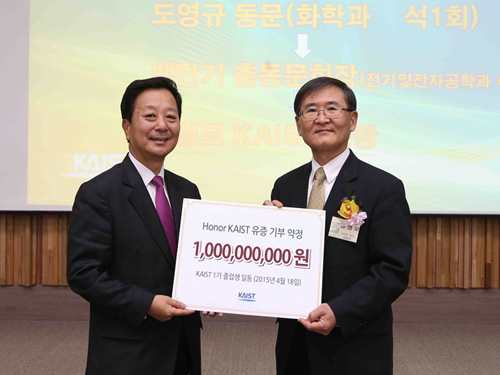 KAIST's Alumni Announces Its Vision to Raise Development Funds
The 40th anniversary of the Graduation and Homecoming Day took place at Seoul campus on April 18, 2015.
KAIST’s alumni announced its long-term vision called “Honor KAIST” to raise the development fund of USD 1 billion by 2100 at the 40th anniversary of “The First Master’s Graduation and Homecoming Day.” The anniversary ceremony took place at the Seoul campus on April 18, 2015. President Steve Kang, Man-Ki Paik, President of KAIST Alumni Association, and the first graduates of KAIST master’s program attended the event.
The first 106 master’s graduates of KAIST, the Class of 1975, received their degrees from eight departments. About 18 professors, including Dr. KunMo Chung, who taught the Class of 1975, and 52 graduates such as Suk-Joong Kang, Sik-Chol Kwon, Youngkyu Do, Sung Joo Park, Joon-Taik Park, Hyung-Kang Shin, Dong-Yol Yang, Seong Ihl Woo, Jae Kyu Lee, In-Won Lee, Byoung-Kyu Choi, and Kyu-Young Hwang participated in the homecoming event that proceeded with the tour of Seoul campus and the ceremony to deliver the first donation by the graduates.
The graduates involved in the vision campaign declared: “KAIST graduates have great pride in having taken part in advancing science and technology in Korea and are grateful for the education given by the nation. There is still a long way ahead for KAIST and Korea. The alumni should work together to help shaping the future of KAIST with great interest and affection for the institution.” They also urged KAIST graduates to donate more for their alma mater: “Let us try to participate in donating USD 100,000 in our lifetime!” The graduates added, “Having donations up to USD 1 billion helped MIT become a great university. We should take the lead in aiming to collect such amount by 2100 for KAIST.”
President Kang addressed the ceremony and said in his speech, “The Honor KAIST Development Funds will serve as the foundation for the university’s continuous, strong growth. Every member of KAIST will work in harmony to transfer KAIST into one of the top ten research universities in the world.” He continued, “The funds will be used to further future strategies of KAIST such as high impact Nobel-prize level research and innovative education.”
Contributors will receive benefits including an honorary lifetime email account entitled “Honor.KAIST” and will have their names listed on “The Honor KAIST” website and “The Honor KAIST” commemorative wall.
Picture 1: The First Master’s Graduation and Homecoming Day 2015
Picture 2: President Steve Kang (right) and President Man-Ki Paik of the KAIST Alumni Association
2015.04.22 View 9986
KAIST's Alumni Announces Its Vision to Raise Development Funds
The 40th anniversary of the Graduation and Homecoming Day took place at Seoul campus on April 18, 2015.
KAIST’s alumni announced its long-term vision called “Honor KAIST” to raise the development fund of USD 1 billion by 2100 at the 40th anniversary of “The First Master’s Graduation and Homecoming Day.” The anniversary ceremony took place at the Seoul campus on April 18, 2015. President Steve Kang, Man-Ki Paik, President of KAIST Alumni Association, and the first graduates of KAIST master’s program attended the event.
The first 106 master’s graduates of KAIST, the Class of 1975, received their degrees from eight departments. About 18 professors, including Dr. KunMo Chung, who taught the Class of 1975, and 52 graduates such as Suk-Joong Kang, Sik-Chol Kwon, Youngkyu Do, Sung Joo Park, Joon-Taik Park, Hyung-Kang Shin, Dong-Yol Yang, Seong Ihl Woo, Jae Kyu Lee, In-Won Lee, Byoung-Kyu Choi, and Kyu-Young Hwang participated in the homecoming event that proceeded with the tour of Seoul campus and the ceremony to deliver the first donation by the graduates.
The graduates involved in the vision campaign declared: “KAIST graduates have great pride in having taken part in advancing science and technology in Korea and are grateful for the education given by the nation. There is still a long way ahead for KAIST and Korea. The alumni should work together to help shaping the future of KAIST with great interest and affection for the institution.” They also urged KAIST graduates to donate more for their alma mater: “Let us try to participate in donating USD 100,000 in our lifetime!” The graduates added, “Having donations up to USD 1 billion helped MIT become a great university. We should take the lead in aiming to collect such amount by 2100 for KAIST.”
President Kang addressed the ceremony and said in his speech, “The Honor KAIST Development Funds will serve as the foundation for the university’s continuous, strong growth. Every member of KAIST will work in harmony to transfer KAIST into one of the top ten research universities in the world.” He continued, “The funds will be used to further future strategies of KAIST such as high impact Nobel-prize level research and innovative education.”
Contributors will receive benefits including an honorary lifetime email account entitled “Honor.KAIST” and will have their names listed on “The Honor KAIST” website and “The Honor KAIST” commemorative wall.
Picture 1: The First Master’s Graduation and Homecoming Day 2015
Picture 2: President Steve Kang (right) and President Man-Ki Paik of the KAIST Alumni Association
2015.04.22 View 9986 -
 KAIST and the Naver Corporation Agree to Cooperate in Computer Science
KAIST and Naver, a Korean Internet corporation, concluded a memorandum of understanding (MOU) on April 17, 2015, to cooperate in advancing research and education in computer science.
Doo-Hwan Bae (pictured on the right below), the Dean of School of Computing at KAIST and Jong-Mok Park (pictured on left), the Director of Technical Cooperation at Naver, signed the MOU.
Under this agreement, the two organizations will foster computer scientists and engineers, conduct joint research projects, and develop training programs for entrepreneurs.
KAIST and Naver will organize a steering committee to lay out further details on the agreement.
2015.04.17 View 9297
KAIST and the Naver Corporation Agree to Cooperate in Computer Science
KAIST and Naver, a Korean Internet corporation, concluded a memorandum of understanding (MOU) on April 17, 2015, to cooperate in advancing research and education in computer science.
Doo-Hwan Bae (pictured on the right below), the Dean of School of Computing at KAIST and Jong-Mok Park (pictured on left), the Director of Technical Cooperation at Naver, signed the MOU.
Under this agreement, the two organizations will foster computer scientists and engineers, conduct joint research projects, and develop training programs for entrepreneurs.
KAIST and Naver will organize a steering committee to lay out further details on the agreement.
2015.04.17 View 9297 -
 KAIST Researchers Develops Hyper-Stretchable Elastic-Composite Energy Harvester
A research team led by Professor Keon Jae Lee (http://fand.kaist.ac.kr) of the Department of Materials Science and Engineering at KAIST has developed a hyper-stretchable elastic-composite energy harvesting device called a nanogenerator.
Flexible electronics have come into the market and are enabling new technologies like flexible displays in mobile phone, wearable electronics, and the Internet of Things (IoTs). However, is the degree of flexibility enough for most applications? For many flexible devices, elasticity is a very important issue. For example, wearable/biomedical devices and electronic skins (e-skins) should stretch to conform to arbitrarily curved surfaces and moving body parts such as joints, diaphragms, and tendons. They must be able to withstand the repeated and prolonged mechanical stresses of stretching. In particular, the development of elastic energy devices is regarded as critical to establish power supplies in stretchable applications. Although several researchers have explored diverse stretchable electronics, due to the absence of the appropriate device structures and correspondingly electrodes, researchers have not developed ultra-stretchable and fully-reversible energy conversion devices properly.
Recently, researchers from KAIST and Seoul National University (SNU) have collaborated and demonstrated a facile methodology to obtain a high-performance and hyper-stretchable elastic-composite generator (SEG) using very long silver nanowire-based stretchable electrodes. Their stretchable piezoelectric generator can harvest mechanical energy to produce high power output (~4 V) with large elasticity (~250%) and excellent durability (over 104 cycles). These noteworthy results were achieved by the non-destructive stress- relaxation ability of the unique electrodes as well as the good piezoelectricity of the device components. The new SEG can be applied to a wide-variety of wearable energy-harvesters to transduce biomechanical-stretching energy from the body (or machines) to electrical energy.
Professor Lee said, “This exciting approach introduces an ultra-stretchable piezoelectric generator. It can open avenues for power supplies in universal wearable and biomedical applications as well as self-powered ultra-stretchable electronics.”
This result was published online in the March issue of Advanced Materials, which is entitled “A Hyper-Stretchable Elastic-Composite Energy Harvester.”
YouTube Link: “A hyper-stretchable energy harvester”
https://www.youtube.com/watch?v=EBByFvPVRiU&feature=youtu.be
Figure: Top row: Schematics of hyper-stretchable elastic-composite generator enabled by very long silver nanowire-based stretchable electrodes.
Bottom row: The SEG energy harvester stretched by human hands over 200% strain.
2015.04.14 View 14771
KAIST Researchers Develops Hyper-Stretchable Elastic-Composite Energy Harvester
A research team led by Professor Keon Jae Lee (http://fand.kaist.ac.kr) of the Department of Materials Science and Engineering at KAIST has developed a hyper-stretchable elastic-composite energy harvesting device called a nanogenerator.
Flexible electronics have come into the market and are enabling new technologies like flexible displays in mobile phone, wearable electronics, and the Internet of Things (IoTs). However, is the degree of flexibility enough for most applications? For many flexible devices, elasticity is a very important issue. For example, wearable/biomedical devices and electronic skins (e-skins) should stretch to conform to arbitrarily curved surfaces and moving body parts such as joints, diaphragms, and tendons. They must be able to withstand the repeated and prolonged mechanical stresses of stretching. In particular, the development of elastic energy devices is regarded as critical to establish power supplies in stretchable applications. Although several researchers have explored diverse stretchable electronics, due to the absence of the appropriate device structures and correspondingly electrodes, researchers have not developed ultra-stretchable and fully-reversible energy conversion devices properly.
Recently, researchers from KAIST and Seoul National University (SNU) have collaborated and demonstrated a facile methodology to obtain a high-performance and hyper-stretchable elastic-composite generator (SEG) using very long silver nanowire-based stretchable electrodes. Their stretchable piezoelectric generator can harvest mechanical energy to produce high power output (~4 V) with large elasticity (~250%) and excellent durability (over 104 cycles). These noteworthy results were achieved by the non-destructive stress- relaxation ability of the unique electrodes as well as the good piezoelectricity of the device components. The new SEG can be applied to a wide-variety of wearable energy-harvesters to transduce biomechanical-stretching energy from the body (or machines) to electrical energy.
Professor Lee said, “This exciting approach introduces an ultra-stretchable piezoelectric generator. It can open avenues for power supplies in universal wearable and biomedical applications as well as self-powered ultra-stretchable electronics.”
This result was published online in the March issue of Advanced Materials, which is entitled “A Hyper-Stretchable Elastic-Composite Energy Harvester.”
YouTube Link: “A hyper-stretchable energy harvester”
https://www.youtube.com/watch?v=EBByFvPVRiU&feature=youtu.be
Figure: Top row: Schematics of hyper-stretchable elastic-composite generator enabled by very long silver nanowire-based stretchable electrodes.
Bottom row: The SEG energy harvester stretched by human hands over 200% strain.
2015.04.14 View 14771 -
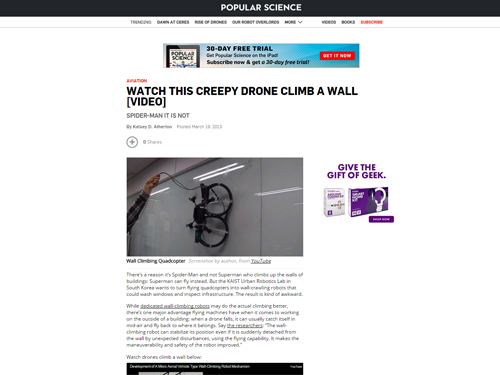 Wall Climbing Quadcopter by KAIST Urban Robotics Lab
Popular Science, an American monthly magazine devoted to general readers of science and technology, published “Watch This Creepy Drone Climb A Wall” online describing a drone that can fly and climb walls on March 19, 2015. The drone is the product of research conducted by Professor Hyun Myung of the Department of Civil and Environmental Engineering at KAIST. The flying quadcopters can turn into wall-crawling robots, or vice versa, when carrying out such assignments as cleaning windows or inspecting a building’s infrastructure. Professor Myung leads the KAIST Urban Robotics Lab (http://urobot.kaist.ac.kr/). For a link to the article, see http://www.popsci.com/watch-drone-climb-wall-video.
Another Popular Science article (posted on April 3, 2015), entitled “South Korea Gets Ready for Drone-on-Drone Warfare with North Korea,” describes a combat system of drones against hostile drones. Professor Hyunchul Shim of the Aerospace Engineering Department at KAIST developed the anti-drone system. He currently heads the Unmanned System Research Group, FDCL, http://unmanned.kaist.ac.kr/) and the Center of Field Robotics for Innovation, Exploration, aNd Defense (C-FRIEND).
2015.04.07 View 13543
Wall Climbing Quadcopter by KAIST Urban Robotics Lab
Popular Science, an American monthly magazine devoted to general readers of science and technology, published “Watch This Creepy Drone Climb A Wall” online describing a drone that can fly and climb walls on March 19, 2015. The drone is the product of research conducted by Professor Hyun Myung of the Department of Civil and Environmental Engineering at KAIST. The flying quadcopters can turn into wall-crawling robots, or vice versa, when carrying out such assignments as cleaning windows or inspecting a building’s infrastructure. Professor Myung leads the KAIST Urban Robotics Lab (http://urobot.kaist.ac.kr/). For a link to the article, see http://www.popsci.com/watch-drone-climb-wall-video.
Another Popular Science article (posted on April 3, 2015), entitled “South Korea Gets Ready for Drone-on-Drone Warfare with North Korea,” describes a combat system of drones against hostile drones. Professor Hyunchul Shim of the Aerospace Engineering Department at KAIST developed the anti-drone system. He currently heads the Unmanned System Research Group, FDCL, http://unmanned.kaist.ac.kr/) and the Center of Field Robotics for Innovation, Exploration, aNd Defense (C-FRIEND).
2015.04.07 View 13543 -
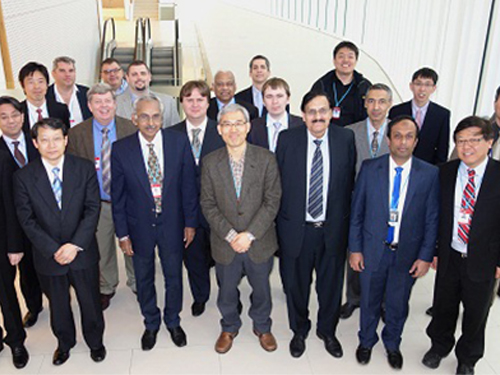 Professor Rim Presents at IAEA Workshop in Vienna
Professor Chun-Taek Rim of the Department of Nuclear and Quantum Engineering at KAIST recently attended the International Atomic Energy Agency (IAEA)’s workshop on the Application of Wireless Technologies in Nuclear Power Plant Instrumentation and Control System. It took place on March 30-April 2, 2015, in Vienna, Austria.
Representing Korea, Professor Rim gave a talk entitled “Highly Reliable Wireless Power and Communications under Severe Accident of Nuclear Power Plants (NPPs).” About 20 industry experts from 12 countries such as AREVA (France), Westinghouse (US), Oak Ridge National Laboratory (US), Hitachi (Japan), and ENEA (Italy) joined the meeting.
The IAEA hosted the workshop to explore the application of wireless technology for the operation and management of NPPs. It formed a committee consisting of eminent professionals worldwide in NPP instrumentation and control systems, communications, and nuclear power to examine this issue in-depth and to conduct various research projects for the next three years.
In particular, the committee will concentrate its research on improving the reliability and safety of using wireless technology, not only in the normal operation of nuclear plants but also in extreme conditions such as the Fukushima Daiichi nuclear accident. The complementation, economic feasibility, and standardization of NPPs when applying wireless technology will be also discussed.
Professor Rim currently leads the Nuclear Power Electronics
and Robotics Lab at KAIST (http://tesla.kaist.ac.kr/index_eng.php?lag=eng).
Picture 1: Professors Rim presents his topic at the IAEA Workshop in Vienna.
Picture 2: The IAEA Workshop Participants
2015.04.07 View 14201
Professor Rim Presents at IAEA Workshop in Vienna
Professor Chun-Taek Rim of the Department of Nuclear and Quantum Engineering at KAIST recently attended the International Atomic Energy Agency (IAEA)’s workshop on the Application of Wireless Technologies in Nuclear Power Plant Instrumentation and Control System. It took place on March 30-April 2, 2015, in Vienna, Austria.
Representing Korea, Professor Rim gave a talk entitled “Highly Reliable Wireless Power and Communications under Severe Accident of Nuclear Power Plants (NPPs).” About 20 industry experts from 12 countries such as AREVA (France), Westinghouse (US), Oak Ridge National Laboratory (US), Hitachi (Japan), and ENEA (Italy) joined the meeting.
The IAEA hosted the workshop to explore the application of wireless technology for the operation and management of NPPs. It formed a committee consisting of eminent professionals worldwide in NPP instrumentation and control systems, communications, and nuclear power to examine this issue in-depth and to conduct various research projects for the next three years.
In particular, the committee will concentrate its research on improving the reliability and safety of using wireless technology, not only in the normal operation of nuclear plants but also in extreme conditions such as the Fukushima Daiichi nuclear accident. The complementation, economic feasibility, and standardization of NPPs when applying wireless technology will be also discussed.
Professor Rim currently leads the Nuclear Power Electronics
and Robotics Lab at KAIST (http://tesla.kaist.ac.kr/index_eng.php?lag=eng).
Picture 1: Professors Rim presents his topic at the IAEA Workshop in Vienna.
Picture 2: The IAEA Workshop Participants
2015.04.07 View 14201 -
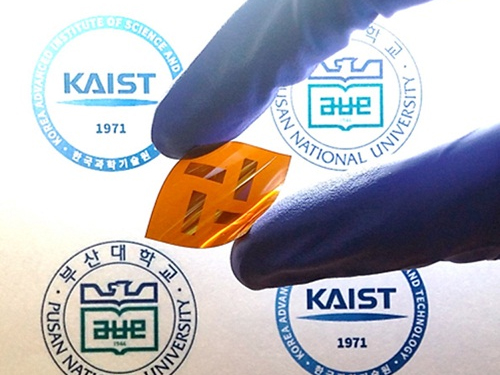 Polymers with Highly Improved Light-transformation Efficiency
A joint Korean research team, led by Professor Bum-Joon Kim of the Department of Chemical and Biomolecular Engineering at KAIST and Professor Young-Woo Han of the Department of Nanofusion Engineering at Pusan National University, has developed a new type of electrically-conductive polymer for solar batteries with an improved light-transformation efficiency of up to 5%. The team considers it a viable replacement for existing plastic batteries for solar power which is viewed as the energy source of the future.
Polymer solar cells have greater structural stability and heat resistance compared to fullerene organic solar cells. However, they have lower light-transformation efficiency—below 4%—compared to 10% of the latter. The low efficiency is due to the failure of blending among the polymers that compose the active layer of the cell. This phenomenon deters the formation and movement of electrons and thus lowers light-transformation efficiency.
By manipulating the structure and concentration of conductive polymers, the team was able to effectively increase the polymer blending and increase light-transformation efficiency. The team was able to maximize the efficiency up to 6% which is the highest reported ratio.
Professor Kim said, “This research demonstrates that conductive polymer plastics can be used widely for solar cells and batteries for mobile devices.”
The research findings were published in the February 18th issue of the Journal of the American Chemical Society (JACS).
Picture: Flexible Solar Cell Polymer Developed by the Research Team
2015.04.05 View 12175
Polymers with Highly Improved Light-transformation Efficiency
A joint Korean research team, led by Professor Bum-Joon Kim of the Department of Chemical and Biomolecular Engineering at KAIST and Professor Young-Woo Han of the Department of Nanofusion Engineering at Pusan National University, has developed a new type of electrically-conductive polymer for solar batteries with an improved light-transformation efficiency of up to 5%. The team considers it a viable replacement for existing plastic batteries for solar power which is viewed as the energy source of the future.
Polymer solar cells have greater structural stability and heat resistance compared to fullerene organic solar cells. However, they have lower light-transformation efficiency—below 4%—compared to 10% of the latter. The low efficiency is due to the failure of blending among the polymers that compose the active layer of the cell. This phenomenon deters the formation and movement of electrons and thus lowers light-transformation efficiency.
By manipulating the structure and concentration of conductive polymers, the team was able to effectively increase the polymer blending and increase light-transformation efficiency. The team was able to maximize the efficiency up to 6% which is the highest reported ratio.
Professor Kim said, “This research demonstrates that conductive polymer plastics can be used widely for solar cells and batteries for mobile devices.”
The research findings were published in the February 18th issue of the Journal of the American Chemical Society (JACS).
Picture: Flexible Solar Cell Polymer Developed by the Research Team
2015.04.05 View 12175 -
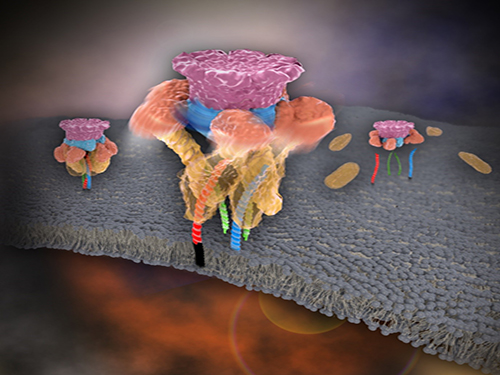 Mystery in Membrane Traffic How NSF Disassembles Single SNAR Complex Solved
KAIST researchers discovered that the protein N-ethylmaleimide-sensitive factor (NSF) unravels a single SNARE complex using one round ATP turnover by tearing the complex with a single burst, contradicting a previous theory that it unwinds in a processive manner.
In 2013, James E. Rothman, Randy W. Schekman, and Thomas C. Südhof won the Nobel Prize in Physiology or Medicine for their discoveries of molecular machineries for vesicle trafficking, a major transport system in cells for maintaining cellular processes. Vesicle traffic acts as a kind of “home-delivery service” in cells. Vesicles package and deliver materials such as proteins and hormones from one cell organelle to another. Then it releases its contents by fusing with the target organelle’s membrane. One example of vesicle traffic is in neuronal communications, where neurotransmitters are released from a neuron. Some of the key proteins for vesicle traffic discovered by the Nobel Prize winners were N-ethylmaleimide-sensitive factor (NSF), alpha-soluble NSF attachment protein (α-SNAP), and soluble SNAP receptors (SNAREs).
SNARE proteins are known as the minimal machinery for membrane fusion. To induce membrane fusion, the proteins combine to form a SNARE complex in a four helical bundle, and NSF and α-SNAP disassemble the SNARE complex for reuse. In particular, NSF can bind an energy source molecule, adenosine triphosphate (ATP), and the ATP-bound NSF develops internal tension via cleavage of ATP. This process is used to exert great force on SNARE complexes, eventually pulling them apart. However, although about 30 years have passed since the Nobel Prize winners’ discovery, how NSF/α-SNAP disassembled the SNARE complex remained a mystery to scientists due to a lack in methodology.
In a recent issue of Science, published on March 27, 2015, a research team, led by Tae-Young Yoon of the Department of Physics at the Korea Advanced Institute of Science and Technology (KAIST) and Reinhard Jahn of the Department of Neurobiology of the Max-Planck-Institute for Biophysical Chemistry, reports that NSF/α-SNAP disassemble a single SNARE complex using various single-molecule biophysical methods that allow them to monitor and manipulate individual protein complexes.
“We have learned that NSF releases energy in a burst within 20 milliseconds to “tear” the SNARE complex apart in a one-step global unfolding reaction, which is immediately followed by the release of SNARE proteins,” said Yoon.
Previously, it was believed that NSF disassembled a SNARE complex by unwinding it in a processive manner. Also, largely unexplained was how many cycles of ATP hydrolysis were required and how these cycles were connected to the disassembly of the SNARE complex.
Yoon added, “From our research, we found that NSF requires hydrolysis of ATPs that were already bound before it attached to the SNAREs—which means that only one round of an ATP turnover is sufficient for SNARE complex disassembly. Moreover, this is possible because NSF pulls a SNARE complex apart by building up the energy from individual ATPs and releasing it at once, yielding a “spring-loaded” mechanism.”
NSF is a member of the ATPases associated with various cellular activities family (AAA+ ATPase), which is essential for many cellular functions such as DNA replication and protein degradation, membrane fusion, microtubule severing, peroxisome biogenesis, signal transduction, and the regulation of gene expression. This research has added valuable new insights and hints for studying AAA+ ATPase proteins, which are crucial for various living beings.
The title of the research paper is “Spring-loaded unraveling of a single SNARE complex by NSF in one round of ATP turnover.” (DOI: 10.1126/science.aaa5267)
Youtube Link: https://www.youtube.com/watch?v=FqTSYHtyHWE&feature=youtu.be
Picture 1. Working model of how NSF/α-SNAP disassemble a single SNARE complex
Picture 2. After neurotransmitter release, NSF disassembles a single SNARE complex using a single round of ATP turnover in a single burst reaction.
2015.03.28 View 11700
Mystery in Membrane Traffic How NSF Disassembles Single SNAR Complex Solved
KAIST researchers discovered that the protein N-ethylmaleimide-sensitive factor (NSF) unravels a single SNARE complex using one round ATP turnover by tearing the complex with a single burst, contradicting a previous theory that it unwinds in a processive manner.
In 2013, James E. Rothman, Randy W. Schekman, and Thomas C. Südhof won the Nobel Prize in Physiology or Medicine for their discoveries of molecular machineries for vesicle trafficking, a major transport system in cells for maintaining cellular processes. Vesicle traffic acts as a kind of “home-delivery service” in cells. Vesicles package and deliver materials such as proteins and hormones from one cell organelle to another. Then it releases its contents by fusing with the target organelle’s membrane. One example of vesicle traffic is in neuronal communications, where neurotransmitters are released from a neuron. Some of the key proteins for vesicle traffic discovered by the Nobel Prize winners were N-ethylmaleimide-sensitive factor (NSF), alpha-soluble NSF attachment protein (α-SNAP), and soluble SNAP receptors (SNAREs).
SNARE proteins are known as the minimal machinery for membrane fusion. To induce membrane fusion, the proteins combine to form a SNARE complex in a four helical bundle, and NSF and α-SNAP disassemble the SNARE complex for reuse. In particular, NSF can bind an energy source molecule, adenosine triphosphate (ATP), and the ATP-bound NSF develops internal tension via cleavage of ATP. This process is used to exert great force on SNARE complexes, eventually pulling them apart. However, although about 30 years have passed since the Nobel Prize winners’ discovery, how NSF/α-SNAP disassembled the SNARE complex remained a mystery to scientists due to a lack in methodology.
In a recent issue of Science, published on March 27, 2015, a research team, led by Tae-Young Yoon of the Department of Physics at the Korea Advanced Institute of Science and Technology (KAIST) and Reinhard Jahn of the Department of Neurobiology of the Max-Planck-Institute for Biophysical Chemistry, reports that NSF/α-SNAP disassemble a single SNARE complex using various single-molecule biophysical methods that allow them to monitor and manipulate individual protein complexes.
“We have learned that NSF releases energy in a burst within 20 milliseconds to “tear” the SNARE complex apart in a one-step global unfolding reaction, which is immediately followed by the release of SNARE proteins,” said Yoon.
Previously, it was believed that NSF disassembled a SNARE complex by unwinding it in a processive manner. Also, largely unexplained was how many cycles of ATP hydrolysis were required and how these cycles were connected to the disassembly of the SNARE complex.
Yoon added, “From our research, we found that NSF requires hydrolysis of ATPs that were already bound before it attached to the SNAREs—which means that only one round of an ATP turnover is sufficient for SNARE complex disassembly. Moreover, this is possible because NSF pulls a SNARE complex apart by building up the energy from individual ATPs and releasing it at once, yielding a “spring-loaded” mechanism.”
NSF is a member of the ATPases associated with various cellular activities family (AAA+ ATPase), which is essential for many cellular functions such as DNA replication and protein degradation, membrane fusion, microtubule severing, peroxisome biogenesis, signal transduction, and the regulation of gene expression. This research has added valuable new insights and hints for studying AAA+ ATPase proteins, which are crucial for various living beings.
The title of the research paper is “Spring-loaded unraveling of a single SNARE complex by NSF in one round of ATP turnover.” (DOI: 10.1126/science.aaa5267)
Youtube Link: https://www.youtube.com/watch?v=FqTSYHtyHWE&feature=youtu.be
Picture 1. Working model of how NSF/α-SNAP disassemble a single SNARE complex
Picture 2. After neurotransmitter release, NSF disassembles a single SNARE complex using a single round of ATP turnover in a single burst reaction.
2015.03.28 View 11700 -
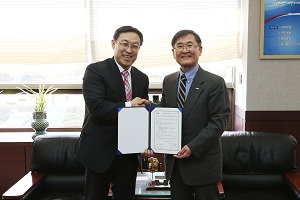 KAIST & the Classic 500 Co Sign for Mobile Healthcare Research
KAIST and The Classic 500 Co., Ltd., an elder care provider based in Seoul, signed a memorandum of understanding to expand medical services by cooperating on the research of medical services and IT on March 24, 2015.
Twenty people from the two institutions, including President Steve Kang, Dong-Hyun Bak, CEO of The Classic 500 and Mun-Sul Jeong, a former KAIST Chairman of the Board, attended the signing ceremony.
Under the agreement, the two institutions will cooperate on mobile healthcare research and the development of a telemedicine system. They will also research and develop a system to better serve society with medical services.
The Classic 500, established by Konkuk University in Korea, provides nursing care services and assisted living facilities for senior citizens.
2015.03.26 View 9628
KAIST & the Classic 500 Co Sign for Mobile Healthcare Research
KAIST and The Classic 500 Co., Ltd., an elder care provider based in Seoul, signed a memorandum of understanding to expand medical services by cooperating on the research of medical services and IT on March 24, 2015.
Twenty people from the two institutions, including President Steve Kang, Dong-Hyun Bak, CEO of The Classic 500 and Mun-Sul Jeong, a former KAIST Chairman of the Board, attended the signing ceremony.
Under the agreement, the two institutions will cooperate on mobile healthcare research and the development of a telemedicine system. They will also research and develop a system to better serve society with medical services.
The Classic 500, established by Konkuk University in Korea, provides nursing care services and assisted living facilities for senior citizens.
2015.03.26 View 9628 -
 KAIST Develops a Credit-Card-Thick Flexible Lithium Ion Battery
Since the battery can be charged wirelessly, useful applications are expected including medical patches and smart cards.
Professor Jang Wook Choi at KAIST’s Graduate School of Energy, Environment, Water, and Sustainability (EEWS) and Dr. Jae Yong Song at the Korea Research Institute of Standards and Science jointly led research to invent a flexible lithium ion battery that is thinner than a credit card and can be charged wirelessly.
Their research findings were published online in Nano Letters on March 6, 2015. Lithium ion batteries are widely used today in various electronics including mobile devices and electronic cars. Researchers said that their work could help accelerate the development of flexible and wearable electronics.
Conventional lithium ion batteries are manufactured based on a layering technology, stacking up anodes, separating films, and cathodes like a sandwich, which makes it difficult to reduce their thickness. In addition, friction arises between layers, making the batteries impossible to bend. The coating films of electrodes easily come off, which contributes to the batteries’ poor performance.
The research team abandoned the existing production technology. Instead, they removed the separating films, layered the cathodes and anodes collinearly on a plane, and created a partition between electrodes to eliminate potential problems, such as short circuits and voltage dips, commonly present in lithium ion batteries.
After more than five thousand consecutive flexing experiments, the research team confirmed the possibility of a more flexible electrode structure while maintaining the battery performance comparable to the level of current lithium ion batteries.
Flexible batteries can be applied to integrated smart cards, cosmetic and medical patches, and skin adhesive sensors that can control a computer with voice commands or gesture as seen in the movie “Iron Man.”
Moreover, the team has successfully developed wireless-charging technology using electromagnetic induction and solar batteries.
They are currently developing a mass production process to combine this planar battery technology and printing, to ultimately create a new paradigm to print semiconductors and batteries using 3D printers.
Professor Choi said, “This new technology will contribute to diversifying patch functions as it is applicable to power various adhesive medical patches.”
Picture 1: Medical patch (left) and flexible secondary battery (right)
Picture 2: Diagram of flexible battery
Picture 3: Smart card embedding flexible battery
2015.03.24 View 13721
KAIST Develops a Credit-Card-Thick Flexible Lithium Ion Battery
Since the battery can be charged wirelessly, useful applications are expected including medical patches and smart cards.
Professor Jang Wook Choi at KAIST’s Graduate School of Energy, Environment, Water, and Sustainability (EEWS) and Dr. Jae Yong Song at the Korea Research Institute of Standards and Science jointly led research to invent a flexible lithium ion battery that is thinner than a credit card and can be charged wirelessly.
Their research findings were published online in Nano Letters on March 6, 2015. Lithium ion batteries are widely used today in various electronics including mobile devices and electronic cars. Researchers said that their work could help accelerate the development of flexible and wearable electronics.
Conventional lithium ion batteries are manufactured based on a layering technology, stacking up anodes, separating films, and cathodes like a sandwich, which makes it difficult to reduce their thickness. In addition, friction arises between layers, making the batteries impossible to bend. The coating films of electrodes easily come off, which contributes to the batteries’ poor performance.
The research team abandoned the existing production technology. Instead, they removed the separating films, layered the cathodes and anodes collinearly on a plane, and created a partition between electrodes to eliminate potential problems, such as short circuits and voltage dips, commonly present in lithium ion batteries.
After more than five thousand consecutive flexing experiments, the research team confirmed the possibility of a more flexible electrode structure while maintaining the battery performance comparable to the level of current lithium ion batteries.
Flexible batteries can be applied to integrated smart cards, cosmetic and medical patches, and skin adhesive sensors that can control a computer with voice commands or gesture as seen in the movie “Iron Man.”
Moreover, the team has successfully developed wireless-charging technology using electromagnetic induction and solar batteries.
They are currently developing a mass production process to combine this planar battery technology and printing, to ultimately create a new paradigm to print semiconductors and batteries using 3D printers.
Professor Choi said, “This new technology will contribute to diversifying patch functions as it is applicable to power various adhesive medical patches.”
Picture 1: Medical patch (left) and flexible secondary battery (right)
Picture 2: Diagram of flexible battery
Picture 3: Smart card embedding flexible battery
2015.03.24 View 13721